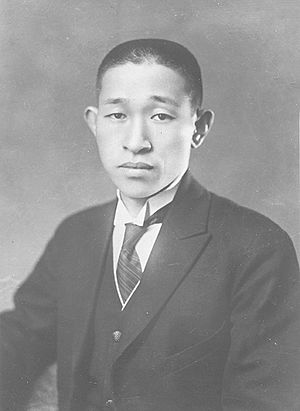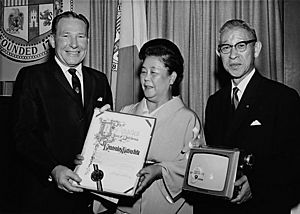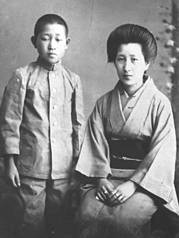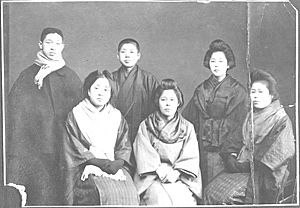Kōnosuke Matsushita facts for kids
Quick facts for kids
Kōnosuke Matsushita
|
|
|---|---|
| 松下 幸之助 | |

Matsushita in 1929
|
|
| Born | 27 November 1894 |
| Died | 27 April 1989 (aged 94) Moriguchi, Osaka, Japan
|
| Nationality | |
| Occupation | Businessman and industrialist |
| Known for | Founder of Panasonic |
| Net worth | US$3 billion(1989) |
| Spouse(s) | Mumeno Iue |
| Children | Sachiko Matsushita |
| Relatives |
|
| Awards |
|
| Signature | |
 |
|
Kōnosuke Matsushita (born November 27, 1894 – died April 27, 1989) was a famous Japanese businessman. He founded Panasonic, which grew into one of Japan's largest electronics companies.
Contents
Early Life and Dreams
A Young Start in Wakayama
Kōnosuke Matsushita was born on November 27, 1894, in Wakayama Prefecture, Japan. His father was a wealthy landowner in a farming village. This meant his family had a good life when he was very young.
Moving to Osaka for Work
When Matsushita was still a child, his family faced financial difficulties. This meant he had to leave school early to find work. He moved to the big city of Osaka to become an apprentice at a shop that sold hibachi (Japanese heating devices).
Unfortunately, the hibachi business failed less than a year later. Matsushita then looked for a new job. He found work at the Osaka Electric Light Company, which was an electricity company.
Learning About Electricity
Over the next few years, Matsushita worked hard and was promoted many times. He learned a lot about electricity and how things worked. During this time, he met Mumeno Iue, who was a friend of his sister. They fell in love and got married. Matsushita now had a family to support, which made him even more determined to succeed.
An Idea for a New Light Socket
By the age of 22, Matsushita became an electrical inspector. He spent his free time working on an idea for a new and better light socket. He thought his invention would be very useful. However, when he showed it to his boss, his boss was not interested.
Starting His Own Company
Taking a Big Risk
In 1917, Matsushita decided to leave his job at the Osaka Electric Light Company. He wanted to start his own business. This was a very brave step because he didn't have much money, a lot of education, or experience in making products.
He set up his first workshop in the basement of his small home. With his wife, his brother-in-law Toshio Iue, and a few helpers, he started making samples of his new light socket.
Facing Early Challenges
At first, it was very hard. Matsushita tried to sell his products to big stores, but they weren't interested because he only had one product. His helpers soon left, and he was left with just his wife and brother-in-law.
Just when things looked really bad, Matsushita got a big order for a thousand special plates for electric fans. This unexpected order saved his company! From then on, he was able to keep making his light sockets.
Quality and Affordability
Matsushita's light sockets became popular because they were better quality and cheaper than other products. The early years were still tough. He even had to sell his wife's special kimono once to get money. His products were first sold under the name "National." Later, they became known as Panasonic, Quasar, and Technics.
A Better Bicycle Lamp
One of Matsushita's best inventions was a much better battery-powered bicycle lamp. In the 1920s, bicycle lamps used candles or oil, and they only lasted about three hours. Matsushita created an oval lamp that used a battery and a lightbulb. It was a huge improvement! He even went to bicycle shops himself to sell his new lamps.
Growing the Business
Focusing on Sales
Matsushita learned an important lesson while trying to sell his bicycle lamp. He realized that even if you have the best product, it won't matter if you can't sell it. So, he started to focus less on just making things and more on how to sell them.
He began building a strong sales team and a network of retail stores. This helped Matsushita's company become a major player in Japan's electronics industry.
Organizing for Success
In 1929, Matsushita created a new structure for his company. He set up different divisions, each specializing in a certain product. For example, there was a division for bicycle lamps and batteries, one for electrical sockets, and one for radios.
Each division had its own national sales department with offices in different parts of Japan. These offices made sure that sales and manufacturing worked together. Products were made based on how many people wanted to buy them. This way, the company avoided making too much or too little.
After World War II
Saving the Company
After World War II, the United States occupied Japan. General Douglas MacArthur wanted to break up large Japanese business groups called zaibatsu. Matsushita's company was in danger, and he might have been removed as president. However, 15,000 of his employees signed a petition to support him, and he was allowed to stay.
In 1947, Kōnosuke Matsushita helped his brother-in-law, Toshio Iue, start a new company called Sanyo Electric. He lent Toshio a factory that wasn't being fully used to make bicycle lamps.
Global Expansion
From 1950 to 1973, Matsushita's company became one of the world's biggest makers of electrical goods. These products were sold under famous names like Panasonic and Technics.
Matsushita stepped down as President of Panasonic in 1961. His son-in-law, Masaharu Matsushita, took over. Kōnosuke Matsushita's grandsons, Masayuki Matsushita and Hiro Matsushita, also became important figures in the business world. Hiro Matsushita is a former race car driver and owns an aerospace company called Swift Engineering.
Retirement and New Ventures
Kōnosuke Matsushita stayed involved with Panasonic until he fully retired in 1973. He also helped form a partnership with the manufacturer JVC in 1954, and his company still owns a large part of it today.
After retiring, Matsushita focused on sharing his ideas about business and society. He wrote 44 books! One of his books, "Developing A Road To Peace And Happiness Through Prosperity," sold over four million copies. In 1979, at 84 years old, he founded the Matsushita School of Government and Management. This school was created to train future leaders for Japan.
In 1987, he received a very high honor called the Grand Cordon of the Order of the Paulownia Flowers.
His Final Years
Kōnosuke Matsushita passed away on April 27, 1989, at the age of 94. He had been suffering from lung problems, which led to pneumonia. When he died, he had personal savings worth US$3 billion. His company, Panasonic, was making US$42 billion in revenue each year.
Awards and Honors

Kōnosuke Matsushita received many important awards and honors during his lifetime.
Awards from Japan
- Grand Cordon of the Order of the Paulownia Flowers (1987)
- Grand Cordon of the Order of the Rising Sun (1981)
- Grand Cordon of the Order of the Sacred Treasure
- Recipient of the Medal with Blue Ribbon
- Recipient of the Medal with Dark Blue Ribbon
- Senior Third Rank (awarded after his death in 1989)
International Awards
- Honorary Commander of the Order of the Defender of the Realm from Malaysia (1979)
University Recognition
Stanford University in the United States honored Konosuke Matsushita by creating a special teaching position. It is called the Konosuke Matsushita Professorship in International Strategy and Management.
See also
 In Spanish: Kōnosuke Matsushita para niños
In Spanish: Kōnosuke Matsushita para niños
 | Stephanie Wilson |
 | Charles Bolden |
 | Ronald McNair |
 | Frederick D. Gregory |



